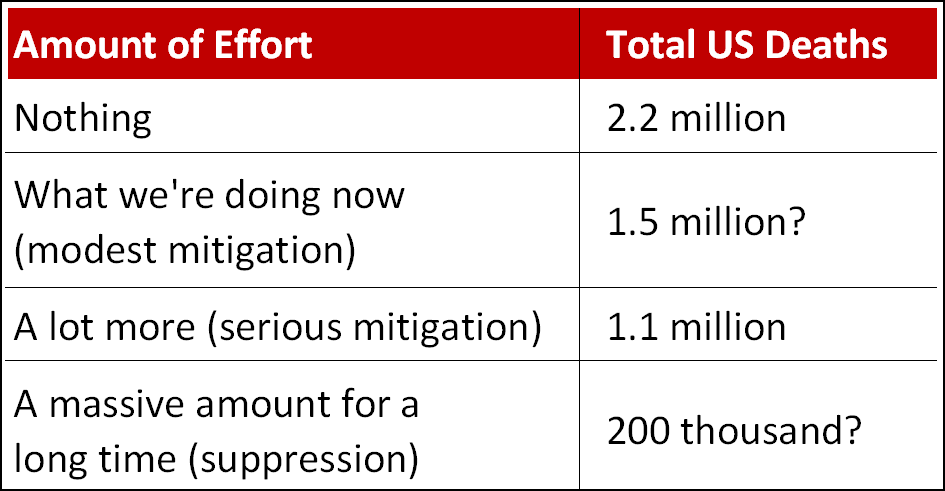I’ve seen a lot of people quoting the Imperial College study of coronavirus spread, so I want to repost this chart:

It’s the top and bottom numbers that are important right now. President Trump would like us to “open the economy,” which for all practical purposes means doing nearly nothing. The IC study suggests that in this scenario around 2 million people will die.
If we get as serious as Italy—shut down everything, close every school, get everyone off the streets, and aggressively trace every known case—and if we do it for the next three months or so—we could get the number of deaths down to 200,000 or so. That’s about 0.06 percent of the population, similar to what Italy is likely to suffer.
This is the difference we’re looking at: 200,000 vs. 2 million. The first case is bad but manageable, and the Senate rescue bill would keep most people whole and ensure that the economy can pop back to life quickly when the control measures are over. The second is a catastrophe, and even with the rescue bill in place it would most likely produce a deep recession that would last through the end of the year at least.
The control measures are no fun. No president wants to be the guy who has to enforce them. But without them 2 million people will die and we’ll probably suffer a deep recession. Why would anyone in their right mind choose that option?
POSTSCRIPT: Why do I think the economy would do better with strict control measures? Think of it this way.
If we put control measures in place, we’re providing substantial certainty to everyone. The rescue bill keeps incomes flowing, and when the control measures are lifted everyone can go back to work. Since they’ve been taken care of during the crisis, their savings are intact and they’ll be willing to immediately raise their consumption to normal levels. We’d be in a deep recession for a few months, but it’s only a recession in a very technical sense since we’ve deliberately engineered it and everyone knows exactly what caused it. There’s no reason to think we wouldn’t bounce back as soon as we announce that the epidemic is over.
If we don’t put control measures in place, lots of people will die and the epidemic will last longer. That’s bad on its own, but it also introduces terrific uncertainty. The huge number of deaths will depress the economy for a while and those workers will only be slowly replaced. People will remain afraid to spend money until they’re sure the epidemic is over, and that’s going to be a very dicey thing. This would fundamentally be like a normal recession, in which we take a dive and then come back out of it slowly as businesses and consumers haltingly regain confidence.
The crazy thing about this is that the first scenario is almost certainly better not just from a humanitarian point of view, but also from a political point of view. Trump could be a hero and the economy would be in strong shape by November. In the second scenario, fear and recession remain in place for months, only slowly dissipating. Trump would be doomed on Election Day. How does he not get that?













